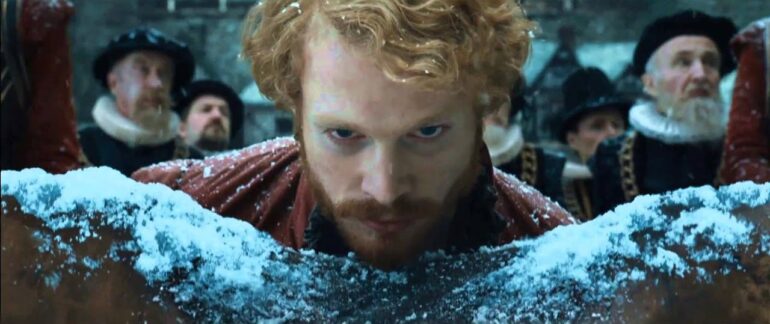Verdict
Summary
Anonymous provides an interesting alternative to the William Shakespeare legend with compelling performances and wonderful set pieces.
Plot: Edward De Vere (Rhys Ifans) bequeaths his plays to William Shakespeare (Rafe Spall) to help sway public opinion against Queen Elizabeth’s (Vanessa Redgrave) powerful advisors, the Cecils.
Review: A group of historians named “Oxfordians” allege that the written works credited to William Shakespeare were authored by another individual or set of individuals. This is challenged by another group of scholars, termed “Stratfordians,” who ardently insist that Shakespeare wrote everything credited to him. I don’t fall on either side – having not been alive in the late 16th or early 17th century or living in England, I can’t know what is fact. Like most cultural battlegrounds these days, the fight seems more important to the participants than the worth of the outcome. The fact that we have these wonderful stories that have influenced writing for generations is enough for me.
So, I didn’t go into Anonymous expecting to be angry at the outcome and walked out feeling the same. Anonymous is someone’s possible interpretation of real-life events that I cannot validate as false or close to truth. I know the film has a series of historical inaccuracies (including the dates some of the plays were produced), but that also doesn’t bother me. You want real life, watch a documentary or better yet, go outside. This is all entertainment to me, fanciful flights that pass a resemblance to the world we live in.
What Anonymous is, undeniably, is entertaining. A twisting, complex series of interpersonal relationships that leads the viewer through a corridor of intrigue rife with incest, politics, near misses, lies, betrayals and even murder. The story is classic Roland Emmerich, just realistic enough to provide verisimilitude, just outrageous enough to be obviously fictional. While the series of events that the veteran German tale-spinner could not have possibly happened, it’s a hell of a fun ride to imagine it could.
Buoyed by these outrageous events are some true powerhouse performances. Rhys Ifans is at his best as the doomed Earl of Oxford, a tortured genius whose greatest achievements belong to someone else due to his scandalous past. Sebastian Armesto is a revelation as Ben Jonson, the young poet and playwright driven to cynicism at too young an age. Vanessa Redgrave, David Thewlis, Mark Rylance, Joely Richardson and Rafe Spall are featured and do serviceable work in their respective roles. Some people were probably outraged by Spall’s buffoonish portrayal of Shakespeare, but considering the story being told, it’s apropos.
You would expect the sets and dressing to be spectacular in this type of movie, and you’d be right. London has often been featured in films, and it really feels in this film like we’re seeing a different, younger and much different city than what we’ve seen in other productions. The Globe, in particular, is a magnificent set that must have been a treat for the actors to perform in. The soundtrack is not memorable, but I suppose it fits the screen’s content, and I don’t recall it being garbage. I’m sure there was a lot of violin work, as that seems to be the instrument of choice for soundtracks for these sorts of films.
In closing, I recommend watching this movie – you don’t have to be a Shakespeare fan to appreciate it. As I said near the top, this movie is pure entertainment and should be treated as such. Any other interpretations or angst over the content is simply missing the point. Regardless of the participants, this is a human story, a tale of how humans can truly make life unfair. I think that sort of theme is easily recognizable, one we would all find universal.


